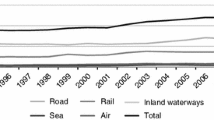
Overview
- Clearly defines Short Sea Shipping alongside its increasing role in the European transport system
- Presents the main cargo types served and the type of vessels utilized in short Sea Shipping
- Explores economic factors affecting the system’s structure, services and strategic planning as well as its financing principles
- Examines environmental performance of Short Sea Shipping as well as its implications within the context of social systems
Part of the book series: Palgrave Studies in Maritime Economics (PSME)
Access this book
Tax calculation will be finalised at checkout
Other ways to access
About this book
This book discusses the main drivers that affect the introduction and growth of short sea shipping services. It describes and analyses the main operational concepts of short sea shipping and introduces relevant administrative and strategic approaches that enable its sustainable execution. Short Sea Shipping (SSS) comprises freight and passenger mobility by waterborne transport at a limited range, without crossing an ocean. Being a direct competitor to land-based transport modes, it uses ports and inland waterways to complement traditional transportation systems, increase capacity, improve flexibility, and contribute towards the goal of sustainable mobility. The reader will be introduced to various aspects of short sea shipping including benefits and shortfalls, relevant regulations and policies, and the applicability of short sea services within a given case or scenario.
Similar content being viewed by others
Keywords
Table of contents (7 chapters)
-
Front Matter
-
Back Matter
Reviews
“This book provides a thorough understanding of short sea shipping and its interrelations with environmental, economic, social, and political factors. … The book offers an abundance of information with respect to the supply and demand of short sea shipping markets, the key routes and major corridors used by short sea shipping, and the economic factors affecting short sea shipping and its strategic planning within maritime clusters.” (Constantinos Chlomoudis, Maritime Economics & Logistics, Vol. 22, 2020)
Authors and Affiliations
About the authors
Dimitrios V. Lyridis is Associate Professor, and Head of the Laboratory of Maritime Transport at the National Technical University of Athens, Greece. His main scientific areas of interest are maritime transport and logistics, shipping finance and environmental protection.
Ioannis G. Koliousis is Lecturer in Operations and Supply Chain Management at Coventry University, UK. He is an expert in the fields of transport planning, cargo and freight logistics, critical infrastructure security and safety.
Vangelis Tsioumas is a full-time faculty and program coordinator for shipping management at The American College of Greece – DEREE.
Eleftherios Sdoukopoulos is a PhD candidate at the University of Piraeus and an associate researcher at the Hellenic Institute of Transport, Greece.
Peter J. Stavroulakis is a mechanical and production engineer, with a master’s in business administration and a master’s in the health sciences occupational and environmental health.
Bibliographic Information
Book Title: The Dynamics of Short Sea Shipping
Book Subtitle: New Practices and Trends
Authors: Stratos Papadimitriou, Dimitrios V. Lyridis, Ioannis G. Koliousis, Vangelis Tsioumas, Eleftherios Sdoukopoulos, Peter J. Stavroulakis
Series Title: Palgrave Studies in Maritime Economics
DOI: https://doi.org/10.1007/978-3-319-98044-7
Publisher: Palgrave Macmillan Cham
eBook Packages: Economics and Finance, Economics and Finance (R0)
Copyright Information: The Editor(s) (if applicable) and The Author(s) 2018
Hardcover ISBN: 978-3-319-98043-0Published: 03 December 2018
Softcover ISBN: 978-3-030-40529-8Published: 21 February 2020
eBook ISBN: 978-3-319-98044-7Published: 19 November 2018
Series ISSN: 2662-6551
Series E-ISSN: 2662-656X
Edition Number: 1
Number of Pages: XI, 190
Number of Illustrations: 5 b/w illustrations, 26 illustrations in colour
Topics: Maritime Economics, Supply Chain Management, Regional/Spatial Science



